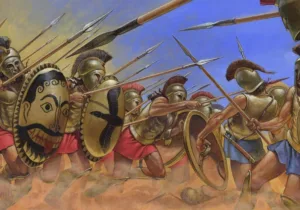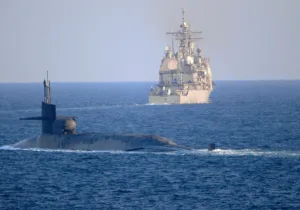Colin Powell’s funeral is tomorrow November 5 at the National Cathedral. He was, as soldier and statesman, a dedicated public servant informed by his Christian faith, as a lifelong Episcopalian. Although the son of Jamaican immigrants, his perspective on America’s global role was decidedly WASPish. Maybe Anglicans no matter their origins have an intuitive understanding of power and national responsibilities. Although he may not have thought of it this way, Powell’s statecraft was identifiably Christian Realist. He strove for the best that he thought possible, no less, and no more.
As a Vietnam War veteran who served as Reagan’s National Security Advisor during the Cold War’s conclusion, as Chairman of the Joint Chiefs during the Persian Gulf War, and Secretary of State during 9-11 and the start of the Afghan and Iraq Wars, Powell was in the cockpit of U.S. global leadership across momentous decades. He was in the mold of Eisenhower, another soldier statesman, not ideological, and firmly committed to responsible stewardship of American strength.
Powell was identified with a doctrine named for him that stressed military force should only deploy if national security interests are directly threatened, for a clear objective with an exit plan, after risks and consequences carefully considered, after other means are exhausted, and with clear domestic and global support. It also stressed overwhelming force instead of incremental build-ups. This doctrine partly originated with Reagan’s Defense Secretary Caspar Weinberger, for whom Powell worked. It obviously sought to avoid repeating the prolonged and tragic drama of Vietnam that obsessed and perhaps even partly paralyzed U.S. strategic thinking for nearly 20 years until the Persian Gulf War.
In that war, the Powell Doctrine was implemented with near perfection. Seven hundred thousand U.S troops deployed to the Persian Gulf, joined by over 200,000 allied troops, with broad domestic and international support, against a clear aggressor, who was quickly defeated. The U.S. then declined to overthrow Saddam but had to keep a military presence in Kuwait and Saudi Arabia to contain him. This presence would help tripwire 9-11, as Osama Bin-Laden cited the infidel U.S. military in the land of Mohammad as justification for his terror. Even carefully crafted doctrines can precipitate unintended consequences. The ultimately disastrous if well-intentioned Somalia intervention also occurred while he was Chairman, in response to domestic outcry over starving Somalis, as did the more decisive Panama intervention to overthrow Manuel Noriega.
But Powell is more recalled of late for his role in the Iraq and Afghan wars, especially the former, which he supported reluctantly. He placed his prestige behind the narrative of Iraqi weapons of mass destruction, which was considered key to gaining international support. He famously warned President Bush, echoing the reputed Pottery Barn Rule of “you break it, you bought it,” as he later recalled, “Once you break it, you are going to own it, and we’re going to be responsible for 26 million people standing there looking at us. And it’s going to suck up a good 40 to 50 percent of the Army for years. And it’s going to take all the oxygen out of the political environment.”
Powell would regret his role in supporting the Iraq War, at least his promotion of the weapons of mass destruction narrative. At the end of his life his also backed U.S. withdrawal from Afghanistan after 20 years, calling it long overdue. Ironically, the U.S. war in Afghanistan was for years heralded as the “good war,” justified directly by 9-11 and the Taliban’s terror, in contrast to the “war of choice” in Iraq. Yet at this moment, it seems that Iraq has turned out relatively better than Afghanistan.
While the Taliban quickly overthrew the pro-U.S. regime in Afghanistan once the U.S. began withdrawing, Iraq just concluded relatively “well-managed and competitive” parliamentary elections, peacefully, and with 9 million Iraqis, or 41 percent of eligible voters, participating. This number was low for Iraq but contrasts with 18% of eligible Afghans who voted in their last election. Pro-Iranian parties lost seats, as did parties overall with militias. Typically disempowered Sunnis participated and did well. Possibly after defeating ISIS and resisting Iranian influence, Iraq now has an increased sense of nationhood. Freedom House still ranks Iraq as “not free” thanks to corruption, disorder and threats of violence, yet admits Iraq’s legislative elections are fairly free and fair. Of course, Iraq could still implode, yet it’s clearly on a more positive trajectory than Afghanistan.
It’s conventional to judge nearly all U.S. policy in the Mideast over 20 years as a failure, especially Iraq, but such judgments often overlook what the Mideast would have been had Saddam remained in power. Sweeping assumptions about recent events should always be somewhat conditional. If Iraq endures and perhaps even develops into a functioning semi-democratic state, the verdict on the Iraq War may eventually evolve.
In 80 or 100 years Iraq may be recalled (if remembered much at all) as similar to the Philippines-American War, a terrible and possibly unavoidable mess whose alternatives were even worse and that eventually stabilized. Powell stressed weapons of mass destruction to gain United Nations and wider global support. But the removal of Saddam arguably had other justifications and benefits.
If Powell’s role in the Iraq War is cited during his funeral tomorrow, it will be a brief lament tinged with tragedy. And there has been much tragedy. But sometimes tragedy is redeemed. We don’t yet know Iraq’s future, but Powell as a Christian would agree that there’s always hope.






